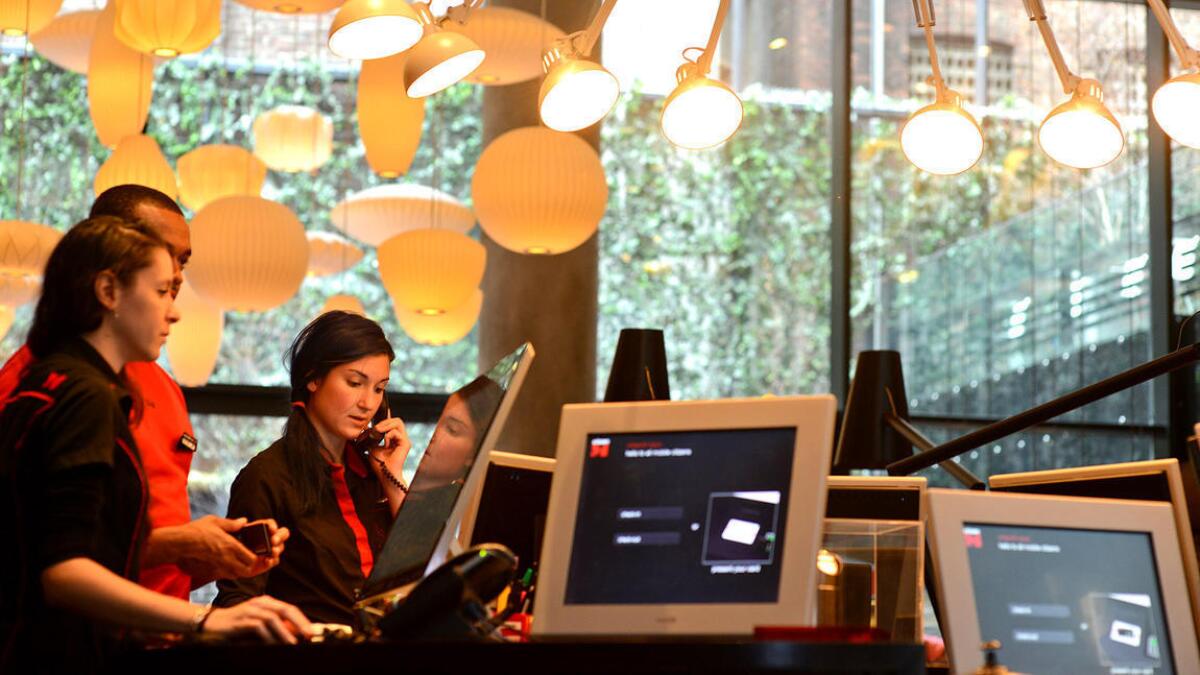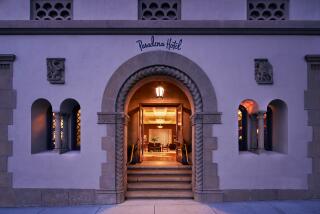Hotel giants target tech-savvy millennial travelers

The minimalist citizenM hotel boasts on its website: ”We sold the hotel cliches and used the money to make your stay cheaper.”
- Share via
At the latest breed of hotel, rooms are up to one-third smaller than traditional quarters, with furniture that looks fresh from an Ikea showroom.
The work desk is downsized and might double as a nightstand. The Internet speed is super fast. The Wi-Fi is free. Power outlets and USB ports dot the walls, especially near the bed to accommodate binge watching.
The target is the millennial traveler, ages 18 to 34, who likes to stay connected online, eat on the run and commune with other millennials.
Hotel giants, including Marriott International and Hilton Worldwide, are launching brands with names such as Moxy, AC, Edition, CitizenM and Canopy. Even billionaire Sir Richard Branson has a new millennial-oriented chain, dubbed Virgin Hotels.
For good reason: Millennials number more than 75 million in the U.S., and this year the Census Bureau projects they will surpass baby boomers as the nation’s largest generation.
Plus, they have money to blow. U.S. millennials plan to spend about $226 billion this year on travel, according to a Harris Poll survey.
“I think it’s definitely a smart move,” said hotel consultant Alan Reay of Atlas Hospitality Group in Costa Mesa. “It’s a huge market.”
Creating a millennial hotel means tossing out some traditional features, such as the talkative concierge or soothing fountain.
Full-service restaurants are usually nixed in favor of healthy food-to-go choices in the lobby.
Business centers are swapped out for spacious gathering areas with communal tables, couches and comfy chairs — sort of a hipper version of the parental home that millennials might still be inhabiting.
The front desk check-in might be replaced by a kiosk transaction, as at the pod-like Yotel inn near New York’s Times Square or Starwood Hotels’ Aloft chain, which is slated to open a location in August near Los Angeles International Airport.
“I don’t spend lots of time in my room,” said Erin Schrode, 23, co-founder of a nonprofit environmental education program in Sausalito, Calif. “If the room is small and the lobby is comfortable and there are niches and corners to work in, I’m great. We are a communal people.”
What the hotels lose in luxury they make up for with technology, including keyless room entry for some hotels and smartphone apps that let guests adjust the room temperature or make restaurant reservations without talking to a human.
At the Aloft hotel in Cupertino, Calif., not far from Apple’s headquarters, a 3-foot-tall robot delivers snacks or other small items to guest rooms. The Apple Watch will be able to handle check-in at certain Aloft hotels.
The Yotel New York employs a one-armed robot to ferry luggage into storage lockers, all behind glass. At the nearby CitizenM hotel, each room comes equipped with a Samsung tablet to control lighting, curtains and other features.
“The new traveling generation has a different DNA than their parents and grandparents,” said Harry Wheeler, a principal at hotel design firm Group One Partners.
Daria Taylor, 26, welcomes the new hotel style. Taylor said she travels regularly for her job as co-founder of a London-based digital entertainment and youth insights agency.
“I think hotels are very slow at adapting to change,” she said. “Many have outdated designs, stuffy communal areas and don’t have basic things like Wi-Fi or automated check-in systems.”
For Katelyn O’Shaughnessy, 28, convenience is a top priority.
“I don’t want to stand in line to check in,” said the founder of a Venice travel start-up who is on the road at least twice a month. “I would rather have mobile check-in so I can get right to my room.”
As for room size, she quipped: “You can put me in a closet; as long as there is Wi-Fi, I’ll be happy.”
Millennials say they don’t want to spend on frills but insist on modern amenities and a location within walking distance of bars, restaurants and other nightlife.
The rates for millennial-oriented hotels typically range from $150 to $200 a night, less than full-service hotels but not as cheap as economy hotels, consultant Reay said.
The minimalist CitizenM boasts on its website that “we sold the hotel cliches and used the money to make your stay cheaper,” with rooms starting at $199 a night.
The 230-room hotel, which opened last year, also houses a 24-hour cafeteria, as well as a full-service coffee and cocktail bar.
Marriott International is launching three hotel brands for millennials in the U.S. Moxy is Marriott’s mid-price boutique hotel that is set to open in eight locations in the U.S., including New York, San Francisco, Seattle and New Orleans, starting as early as next year.
AC is Marriott’s European-style brand that has opened U.S. hotels in New Orleans and Kansas City, Mo., with a third slated to open in Washington, D.C., next month.
Edition is Marriott’s high-end brand that opened its first U.S. hotel in Miami Beach last year, with another scheduled to open in New York later this year.
“They center around social media and technology with an emphasis on style and design,” said Tina Edmundson, Marriott’s global officer for luxury and lifestyle brands.
Montage Hotels & Resorts, based in Laguna Beach, plans to open its own millennial hotel, called Pendry, in San Diego next year. The company describes the new brand as “London hip, New York paced and California healthy.”
Billionaire entrepreneur Branson launched Virgin Hotels last year in Chicago. He has announced plans to open a Virgin Hotel in New York next year, with others under consideration in Los Angeles, San Francisco and several other cities.
The Virgin Hotel in Chicago features rooms with sliding doors that separate the bedroom from the bathroom, hallway and closet. The rooms have mini fridges stocked with snacks at street prices, free high-speed Wi-Fi and a Bluetooth sound system.
Even budget hotel chains are targeting millennials. Red Roof Inn estimates that about 12% of its guests are millennials, up from 9.5% in 2010. To draw more young travelers, Red Roof President Andrew Alexander said, his company is testing outdoor gathering spots with fire pits and picnic areas at hotels in Ohio, Michigan and Florida.
“We want our overall occupancy to outpace our competitors,” he said, “and the millennials will be a big part of that.”
Twitter: @hugomartin
More to Read
Inside the business of entertainment
The Wide Shot brings you news, analysis and insights on everything from streaming wars to production — and what it all means for the future.
You may occasionally receive promotional content from the Los Angeles Times.











